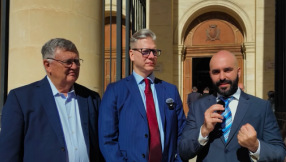A UN committee has intervened to stop a disabled man in France from being starved and dehydrated to death.
Vincent Lambert, 42, has been disabled and in a state of minimal consciousness after sustaining severe brain damage in a motorcycle accident in 2008, although his carers say he is still able to breathe on his own, as well as turn his head and move his eyes.
His family have been divided over his care, with his wife, nephew and five of his siblings favouring the withdrawal of his nutrition and hydration, a move that has the support of his doctors.
His parents and two other siblings have fought against this in the courts for the last six years.
On April 24, the Conseil d'Etat, the highest administrative court in France, ruled that the medical decision to withdraw Mr Lambert's hydration and nutrition until his death was not illegal.
This ruling was backed days later by the European Court of Human Rights, which turned down appeals on behalf of Vincent's life for the second time after having previously done so in 2015.
However, the UN Committee on the Rights of Persons with Disabilities has stepped in to the row by launching its own investigation. It has ordered France to ensure the nutrition and hydration of Mr Lambert during the review process.
French Health Minister Agnes Buzyn said that although the UN's request was not legally binding, France would honour it.
Dr Anthony McCarthy, of the Society for the Protection of Unborn Children, said that the withdrawal of food and water went against the principles of basic care for disabled and vulnerable people.
He said the case also raised a number of concerns.
"Firstly, such conditions are notoriously difficult to diagnose, as a recent literature review has found," he said.
"Secondly, if the aim in withdrawing food and fluids is to eliminate a life no longer considered worthy to continue, there is no moral difference between such 'passive' non-voluntary euthanasia and 'active' non-voluntary euthanasia by, for example, lethal injection.
He continued: "No-one is claiming that every conceivable means must be taken to sustain a patient's life. But nutrition and hydration delivered by tube, which is still sustaining the patient and is not unduly burdensome, is basic care, not extraordinary medical means.
"Where is the 'disproportionate' burden here, including for the patient, who is supposedly unconscious? Is the aim not rather simply to dehydrate to death someone whose life is not considered to have value?"
He added: "It is shocking that the case has had to be taken to such levels. I hope that the UN Committee stands against this attack on the dignity of patients which undermines us all."













